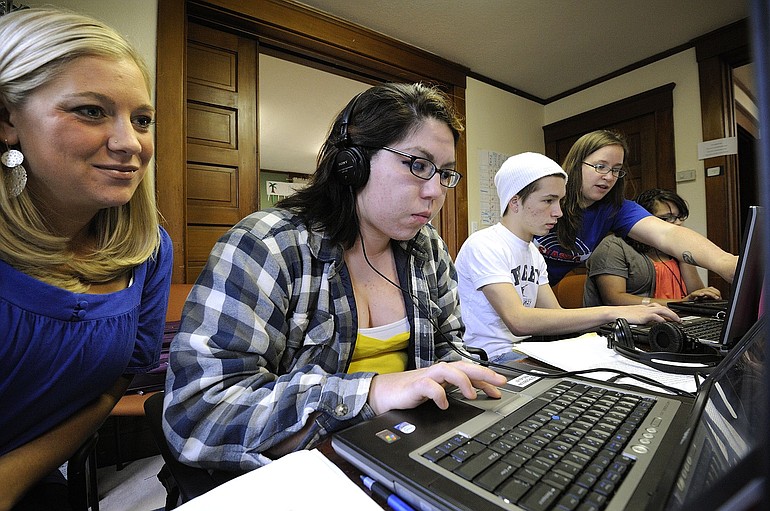The words “My Life” appear across the screen, accompanied by a few notes of a rap song.
Snapshots of 18-year-old Dee Sample appear: There’s one of him in his elementary school years, smiling, followed by photos of him in his teen years, wearing a hoodie and a baseball cap and looking stone-faced.
In the three-minute documentary, narrated by the Mountain View High School student, Sample recounts growing up in the projects in South Carolina, hearing gunshots as he drifted to sleep.
“My heart is feeling colder,” he raps in the tape.
He talks about “getting caught having bags in my room” in high school and winding up in Clark County’s Juvenile Recovery Court.
But there’s a bright spot. “Mom, you’re right. God has blessed me,” he raps as a photo of him and his mother appears.
The screen fades to black. Sample’s peers, seated at a table in the dimly lit room clap as Sample takes a seat.
The teenagers, all participants in Juvenile Recovery Court, were at a workshop last week at the Clark County Youth House to create documentaries chronicling struggles they overcame, some of them dealing with past addictions.
The “digital storytelling” workshop is the latest program as part of Juvenile Recovery Court, a therapeutic court for youngsters charged with nonviolent offenses who are amenable to treatment.
During the last day of the workshop, the teens presented their documentaries to their peers.
Many teenagers involved in the program have substance abuse issues, though that wasn’t the focal point of the digital workshop.
“The tenet of storytelling is telling a story that needs to be told,” explained Angela Zahas, a prevention specialist with the Department of Community Services.
The workshop’s organizers intended to put a positive spin on the negative influences in the teens’ lives and give them more incentive to stay clean.
“The purpose and goal around digital storytelling is that we recognize that people carry stories about their life experiences. It’s part of how we make sense of all these pieces,” said Anna Lookingbill, resource coordinator for Juvenile Recovery Court and an organizer of the workshop. “This is really exciting and we want the kids to feel good about it, proud about it.”
It’s the first program of its type in any of the therapeutic courts, said Brad Finegood, coordinator for Superior Court’s therapeutic courts. A voluntary program, it supplements the teens’ other treatment options in their path toward shedding criminal charges through the court’s year-and-a-half program.
Lookingbill said she will compile all the documentaries and hopes to show them publicly somewhere on April 20 (“4/20”: notorious as a day to smoke marijuana).
She will have another workshop this spring, and the viewing will also include documentaries from that batch of participants.
At last week’s workshop, which took place over three days and ran for six hours a day, the teens learned to create the short films by stringing together photos on Microsoft Movie Maker software to appear along with the music of their choice. They were told to write a 250-word script to narrate the film.
The teens dug deep to decide what their stories were. Mitchell Wells, an 18-year-old Battle Ground High School senior, decided to showcase his family’s religious division: His father is Apostolic Lutheran, while his mother is not.
The division led to feelings of conflict, Wells said, prompting him to rebel.
His documentary includes photos of church buildings around Vancouver and religious statues. In the background is a melancholy piano version of the song “The Funeral,” by the group Band of Horses, which Wells performed himself.
At one point, Wells asks in the documentary: “Why me, God?”
After showing the film to his peers, Wells smiled proudly. “It wasn’t hard to tell, but it made me realize more things about myself,” he said.
Also showing his documentary was Shane Dahl, a 17-year-old student at Evergreen High School. His story is about moving away from his father and battling the challenges of making new friends at a new school — with the stress of his family history of drug abuse.
He concludes the documentary by saying he doesn’t want to end up a drug addict too. And thanks to Juvenile Recovery Court, he says, things are looking up.
“I’m Shane Dahl and my story’s just beginning,” he says.
Laura McVicker: 360-735-4516 or laura.mcvicker@columbian.com.



